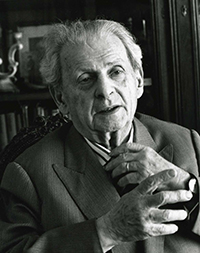Love remains a relation with the Other that turns into need, transcendent exteriority of the other, of the beloved. But love goes beyond the beloved… The possibility of the Other appearing as an object of a need while retaining his alterity, or again,the possibility of enjoying the Other… this simultaneity of need and desire, or concupiscence and transcendence,… constitutes the originality of the erotic which, in this sense, is the equivocal par excellence.
emmanuel Levinasquotes
1906 - 1995

His reasoning dealt mostly with our beliefs toward our encounters with “the Other.” Man’s relationship to another reveals itself to be infinite, and therefore, divine. He begs of man to do no harm, and brings the challenge of ethics out in the open for philosophy to wrestle with in his opus, Totality and Infinity.
As a student of Edmund Husserl and Martin Heidegger during the 20s in Germany, he later wrote Discovering Existence with Husserl and Heidegger, which is one of his most important works, along with Existence and Existents. The latter was written while he was imprisoned, as an officer for the French army, in a Nazi labor camp.
Some have called him a postmodern Rabbi for his open-ended views and new interpretations of Jewish texts (Difficult Freedom). He thought these could help dissolve the problematic thoughts toward Judaism still reflected in Europe after the war. With original thoughts that balanced phenomenology, existentialism and Jewish tradition, Levinas left a legacy reminding humankind that all are connected and responsible for each other.
I will say this quite plainly, what truly human is – and don’t be afraid of this word – love. And I mean it even with everything that burdens love or, i could say it better, responsibility is actually love, as Pascal said: ‘without concupiscence’ [without lust]… love exists without worrying being loved.
human / love / responsibility
The true life is absent. But we are in the world. Metaphysics arises and is maintained in this alibi.
For others, in spite of myself, from myself.
Politics is opposed to morality, as philosophy to naïveté.
morality / naïveté / philosophy / Politics
Faith is not a question of the existence or non-existence of God. It is believing that love without reward is valuable.